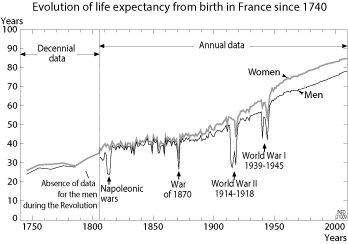Length of life in France
The mean length of life has more than tripled in France over the last two and a half centuries, from 25 years in 1740 to more than 80 years in 2010.
In 2017, life expectancy at birth stands at 79,5 years for men and 85.4 for women in Metropolitan France.
Two and a half centuries of progress
Up to the second half of the eighteenth century, people in France lived for 25 years on average. From 1750, major crises such as famines and epidemics became rarer and medical knowledge improved, thanks notably to the introduction of the smallpox vaccine and better obstetric practices. Child mortality fell as a consequence and life expectancy increased rapidly, reaching 43 years in 1850.
A deep-seated trend despite setbacks in periods of war
The upward trend in mean length of life was interrupted by wars (Napoleonic wars, wars of 1870, 1914-1918 and 1939-1945), and during these periods life expectancy dipped sharply. But once peace was restored, the underlying trend resumed. Length of life levelled off in the mid-nineteenth century however, due to industrialization and urban development which made living conditions for children very harsh, in towns and cities especially, and pushed up infant mortality.
The mean length of life started rising again in the late nineteenth century thanks to progress in hygiene and medicine following the discoveries of Louis Pasteur, and children were the main beneficiaries. The first child welfare policies were also introduced at that time.

From children to adults survival
From the 1950s, the risk of dying from an infectious disease became very small in France, as in most developed countries. Today, the increase in length of life can no longer be attributed to declining infant mortality, since childhood deaths are now very rare. The progress observed is due to a decrease in the risk of dying among other age groups, particularly old people, who are benefiting from progress in the fight against cardiovascular diseases and cancer.
Contact: Gilles Pison
Online: January 2018
